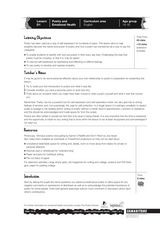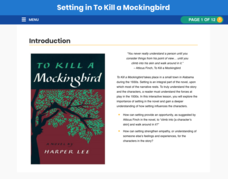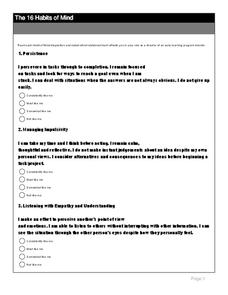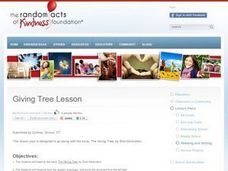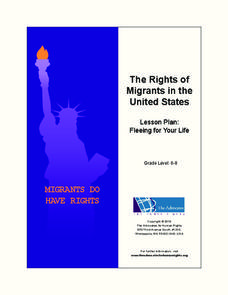Curated OER
Touching Spirit Bear
Designed to be used in conjunction with a reading of Ben Mikaelsen's Touching Spirit Bear, the worksheets and activities in this 32-page packet focus readers' attention on how to break the cycle of violence and develop more productive...
Developing a Global Perspective for Educators
Imagine Being Me
The design of this two-day lesson eloquently exposes learners to the topic of social justice for people with disabilities. The plan is built off the reading of Are You Alone on Purpose? by Nancy Werlin. The activity introduces readers to...
Museum of Disability
Ian’s Walk and Apples for Cheyenne
Help young learners understand friendship and empathy with two reading comprehension lessons. Each lesson focuses on a story about a child with autism, and encourages readers to compare and contrast the characters to each other and to...
Bully Free Systems
Bully Free Lesson Plans—Eighth Grade
Middle schoolers are likely very familiar with the concept of bullying and cliques. Discuss their experiences and brainstorm ways to handle peer conflict and feelings of exclusion with a poem that focuses on bullying, and a second lesson...
Curated OER
Winter Holiday Attitude Adjustment
Students create kind sentences or compliments for each classmate in this feel-good lesson plan ideal for a Language Arts classroom just before Winter break. The lesson plan includes examples of positive comments and detailed instructions.
Curated OER
Looking at the World
This set of discussion questions prompts learners to think about their place in the global community. These questions encourage them to consider food availability, free community services, schooling, and what life in other countries...
University of Minnesota
Mirroring Emotions
Do you ever give your class the "teacher look"? Without saying a word, they become silent and engaged (hopefully). How do they know what you're thinking? Explore the concept of nonverbal communication and how it relates to our mirror...
Curated OER
Muscular Dystrophy: A Walk in Their Shoes
Health and biology learners wear five pound weights on their legs for 24 hours to simulate the extra effort required when people suffer from muscular dystrophy. They research the disability online and write about how it feels to "walk in...
Curated OER
Poetry and Emotional Health
Students explore self-expression through poetry. In this personal health lessons students read and discuss poetry regarding teen topics of interest. Students write poems, that express empathy.
Curated OER
Supporting Opinions: Handling the End of a Friendship
Four thought-provoking questions encourage readers to develop and support their opinions about strategies to end a friendship after exploring excerpts from a New York Times article. The reading is brief so this could be a lead-in to...
PBS
Setting in To Kill a Mockingbird
Can you understand more about how a person acts by learning about how that person lives? An interactive resource explores the setting of Harper Lee's To Kill a Mockingbird with several slides discussing the location, social conditions,...
Transforming Education
SEL for Educators Toolkit
Four resources make up the SEL toolkit for educators. Intended for those that teach kindergarten to twelfth grade, helpful files include a companion guide, presentation, reference list, and a one-page snapshot that neatly showcases the...
Museum of Disability
Stand Tall, Molly Lou Melon
Help to create the next generation of friends with a lesson about accepting people who are different. As kids read Stand Tall, Molly Lou Melon, they answer a series of discussion questions and activities about making friends with others.
Museum of Disability
Don't Call Me Special
Introduce young learners to the idea of disabilities and making friends with children who are different than they are. Using Don't Call Me Special - A First Look at Disability by Pat Thomas, learners are guided through the new vocabulary...
Center School
The 16 Habits of Mind
Which of Costa's 16 Habit of Mind best describes you? Take a short assessment to see which quality is most consistently like you, or which quality is not like you at all.
Thoughtful Learning
Doing Random Acts of Kindness
Encourage scholars to perform random acts of kindness. A lesson challenges participants to choose a peer they wish to be kind to without them knowing. Learners list five good deeds and choose one to fulfill. Pupils reflect on the process...
Curated OER
Giving Tree Lesson
Learners read and respond the book, The Giving Tree. In this literary unit, students listen to the story and discuss the story using Bloom's Taxonomy. Learners write a letter of empathy to the tree and observe the changes the tree went...
Curated OER
You Have to Live in Somebody Else's Country to Understand
Young scholars reflect on emotions commonly expressed by outsiders. They identify feelings of people who have just arrived in America. They read and analyze a poem about immigration.
Teaching Tolerance
Reflection: What’s Your FRAME?
Encourage your class to recognize the diversity in the beliefs and backgrounds of their peers. Learners use the acronym FRAME to consider culture, background, and life experiences.
Advocates for Human Rights
The Rights of Migrants in the United States Lesson Plan: Fleeing for Your Life
A role-playing scenario has middle-schoolers imagining that they are refugees forced to flee their community and integrate into a new one. Then, some play the roles of members of the new community and the class brainstorms ideas about...
Curated OER
Good Relationships
Students explore ways to empathize with others. They read a story and discuss how it reminds them of real live events. students sing a song about love. In a group activity, students trace a picture of their hands. On each finger and...
Curated OER
Medieval Families and the Role of Women
Fifth graders compare families of the past and families of today. In this medieval families lesson, 5th graders complete a chart to compare lives (work, marriage, names, etc) as well as the role of women during the time period. Students...
Curated OER
New Beginnings
Start the year off with a few role-play scenarios focused on positive classroom interactions, respect, and expressing feelings. These scenarios are very oddly worded but pose a good way to help learners build empathy and caring when...
Curated OER
Using Literature as a Tool to end Name Calling
Students use bibliotheraphy or the guided use of books to help solve problems. They support targets of bullying as they express their feelings and learn coping strategies. By using books, students can then identify, catharsis and have...










